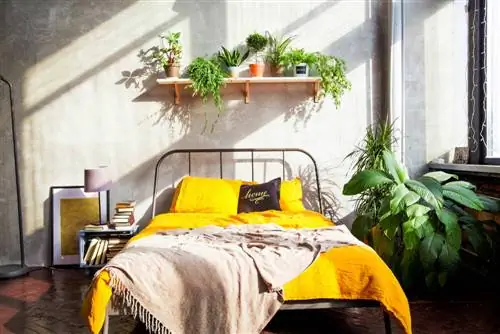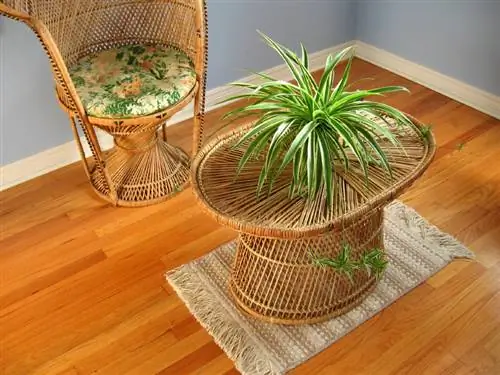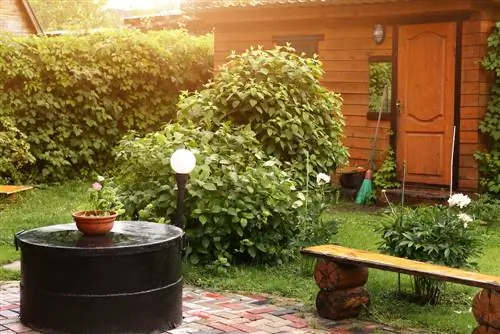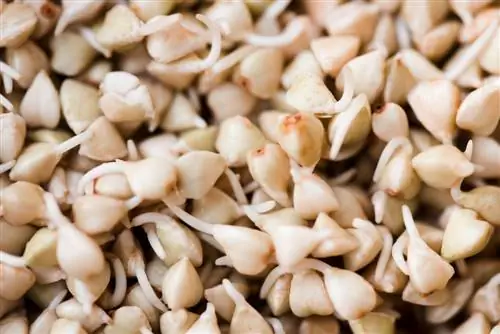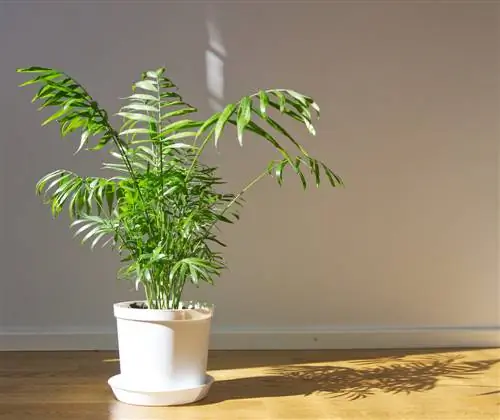- Author admin [email protected].
- Public 2023-12-16 16:46.
- Last modified 2025-06-01 06:02.
Plants make the bedroom more comfortable and improve the indoor climate. They are intended to free the air of pollutants. The effect is hardly measurable indoors because the plants do not filter pollutants through their leaves. The secret lies in the roots.
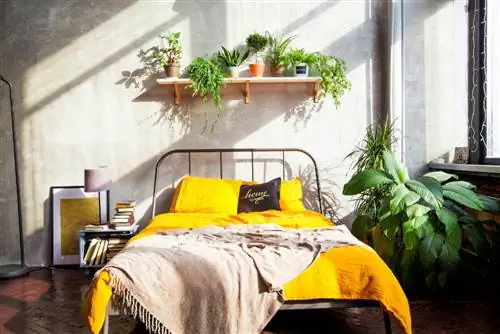
Why are plants good in the bedroom?
Plants in the bedroom can improve the indoor climate, increase the humidity and contribute to relaxation. Popular bedroom plants include aloe vera, arched hemp, spider plant, peace lily, sword plant and money plant. Selection should be based on personal preference and allergic reactions.
Which plants in the bedroom?
According to a NASA study, at least one houseplant should be cultivated for every nine square meters. For a living space of 170 square meters, around 16 plants are optimal. Your list of results includes almost 30 predominantly tropical and subtropical plants.
| removed | Toxicity | |
|---|---|---|
| Common Ivy | Benzene, formaldehyde | poisonous for cats |
| Garden Chrysanthemum | Benzene, formaldehyde, trichloroethene, ammonia | poisonous for dogs and cats |
| rubber tree | Formaldehyde | poisonous for cats |
| Dendrobium orchid | Xylene, toluene | non-toxic for cats |
| Butterfly Orchid | Xylene, toluene | non-toxic for cats |
Aloe vera
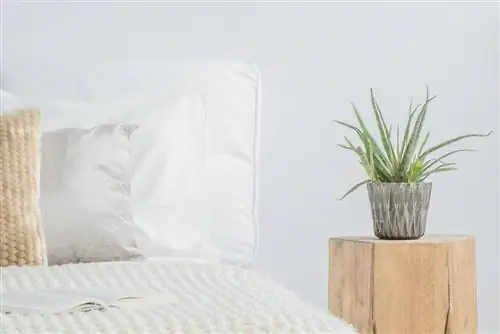
Aloe vera is welcome in the bedroom
The drought-tolerant ornamental plant requires little water and generally requires little care. Since it releases oxygen into the air at night and provides fresh air, it is ideal for the bedroom. You can easily grow offshoots from a plant yourself.
bow hemp
The mother-in-law's tongue is a CAM plant with a special metabolism. During the night, the forgotten houseplant absorbs carbon dioxide from the air to store it. During the day, the bound CO2 is consumed as part of photosynthesis. Sansevieria is also able to filter common household toxins such as formaldehyde, trichloroethane and benzene from the air. This makes the plant an all-rounder, helping against headaches and high blood pressure and having a positive effect on the immune system.

Excursus
Crassulaceae metabolism
This form of metabolism (CAM for short) occurs in succulent plants that live in dry areas. They rely on keeping their stomata closed during the hot part of the day. This reduces water evaporation, which is why such plants have low water requirements.
The plants absorb the CO2 required for photosynthesis during the cooler night. They convert it into malic acid, which is stored in the cell vacuoles. Only the following day do they release the carbon dioxide again so that they can convert it into sugar during metabolism.
Green Lily
This undemanding plant is known for the incessant formation of offshoots. In the NASA study, this plant reduced high formaldehyde levels in an enclosed space by about 90 percent within 24 hours. It cleans the air and removes unpleasant odors. The leaves are edible, but should not be consumed because of their cleansing effect.
Occurrence of formaldehyde:
- in apples and grapes
- in wood and furniture
- in human breathing air
Formaldehyde can impair memory and the ability to concentrate.
Peace Lily
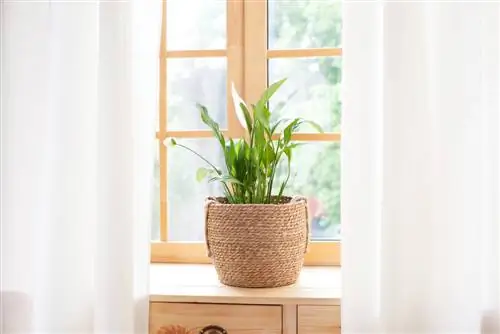
The leaf increases the humidity in the room
The single leaf filters numerous gases such as benzene or ammonia from the air. It manages to reduce the trichlorethylene content by 23 percent. With ivy, this greatest possible filter effect is eleven percent. The easy-care peace lily also ensures higher humidity, which helps against dry mucous membranes. This has a positive effect on the spread of germs in the room air.
Sword Plant
This fern plant frees the room air from formaldehyde, xylene and toluene. The sword plant prefers shady locations, which is why it is ideal for the bedroom. She attaches great importance to high humidity. The exotic plants have a mood-enhancing effect, which has a positive effect on the mind. Stress is reduced and the nervous system returns to balance.
Efeutute
This climbing plant filters more pollutants than are found in the bedroom. It cleans the air of benzene, xylene, toluene, trichloroethene and formaldehyde. This makes the large-leaved ivy plant a true all-rounder. It also looks good on poles or trellises. It can also be cultivated as an ampel plant.
Plants in the bedroom are he althy
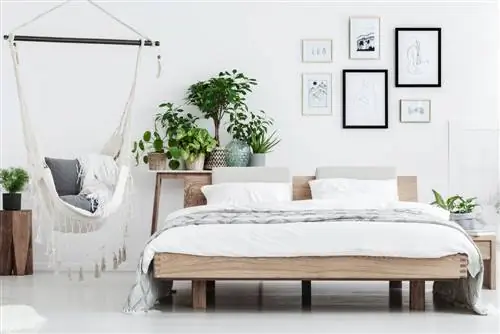
Plants in the bedroom don't just have a purely decorative effect
The air in your own four walls is often affected by chemical vapors from numerous materials. Plastic, printer cartridges, wall paint, glue or detergent can be the cause of permanent dizziness, headaches and respiratory problems.
No dry air in the bedroom
Plants increase air humidity, which has a positive effect on the respiratory system while you sleep. They enable a controlled increase in moisture content by evaporating up to 97 percent of the irrigation water through their leaves and releasing it into the room air - and they do so germ-free. Be careful not to overwater the plants. If mold forms on the potting soil, fungal spores spread into the air. There is also a risk of mold growth if you water the leaves.
Aesthetics with a feel-good factor
The appearance plays a significant role in plants in the bedroom. They set visual accents and give the room a feel-good atmosphere. When you feel comfortable in your bedroom, you can switch off and relax much more easily. At the same time, this promotes he althy sleep and you wake up with an increased sense of well-being. Recovery from illnesses can be enhanced by the improved climate in the bedroom.
Fragrant plants for a he althy sleep:
- Lemon balm: repels mosquitoes and has a refreshing effect
- Lavender: makes restlessness subside
- Jasmine: floral scent has a relaxing effect
- Gardenia: relieves anxiety and promotes sleep
Ideal for allergy sufferers
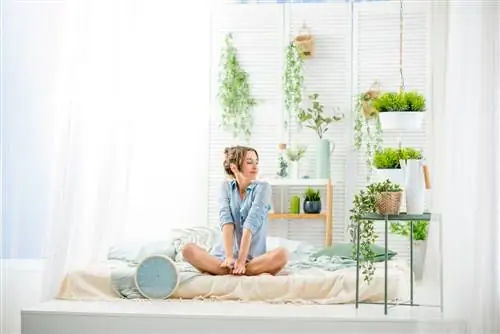
The right plants in the bedroom reduce allergies
In the dry winter time, dust can be stirred up more easily, so that the small particles move more through the room air. Pathogens and germs that can be inhaled by people adhere to the dust particles. Plants reduce this problem because the increased humidity causes dust particles to absorb water. They become heavier and fall to the ground along with pollen, pollutants and allergens.
Dust particles settle on plants with particularly large leaf areas, which then no longer disturb the room air. Make sure to regularly remove dust from the leaves. This allows the plants to optimally develop their positive effects.
Feng Shui
In this theory of harmony, only plants with round leaves are used. No plants with pointed leaves or sharp-edged leaf edges should be placed in the bedroom. These can disrupt the positive energy and send out so-called poison darts. In order for the energy of the room to be positively influenced, the plants should show vigorous growth. A regular supply of fresh air is also important for a he althy indoor climate. To ensure that unwanted substances are removed from the room air, you should ventilate three to four times a day.
Are houseplants air purifiers?
NASA found in its “Clean Air” study that certain plants can reduce the concentration of harmful gases in rooms. This study was carried out in completely enclosed rooms, so the conditions are not comparable to those in your own home.
Finding 1: Barely measurable performance
In fact, Vanessa Hörmann from the Federal Environment Agency in Dessau-Roßlau has found that the filter performance of indoor plants is very weak or not at all. Measurable effects would only occur if several hundred plants were placed in the room. It is still he althy to place lots of plants in the bedroom. They have positive effects on the psyche.
Bedroom plants work:
- concentration promoting
- stress-reducing
- he alth-supporting
Finding 2: Pollutant breakdown via the roots
Helge Knickmeier took a closer look at the NASA study and came across the fact that plants break down air pollutants primarily through their roots. He has invented an innovative flower pot (€24.00 on Amazon) that draws the room air into the interior of the pot. Pollutants are filtered out here so that the environment is measurably supplied with fresh air.

Why no plants in the bedroom?
It is a widespread theory that plants in the bedroom are harmful. In fact, too many potted plants can appear unhe althy due to incorrect care or poor plant selection. Normally, houseplants are not harmful to he alth because their positive properties outweigh the negative ones.
Increased risk of mold
Too many plants in the bedroom can promote mold and bacteria. These organisms find optimal living conditions in moist potting soil and can also spread in the air. He althy people rarely have problems with this. Pay attention to optimal care and do not water your plants too frequently. This automatically reduces the spore load in the air.
Tip
Cultivate your bedroom plants hydroponically. This means that the mold problem is a thing of the past.
Sleep disorder caused by smells
Sensitive people may find the scent of the strong-smelling flowers of lavender and jasmine disturbing. This can lead to headaches and discomfort. Test beforehand which flower scent seems pleasant to you. The smell of damp earth can also be unpleasant.
Myth: lack of oxygen
The fact that many plants absorb oxygen and release CO2 during the night is true. However, this happens in such small quantities that this factor has no effect on people's sleep. For one square meter of leaf surface, the emission of carbon dioxide per hour is 125 milliliters. Humans expel 15 to 30 liters per hour at night. Only when the room turns into an impenetrable jungle do you possibly have too many plants in the bedroom.
Which plants should you not have in your bedroom?
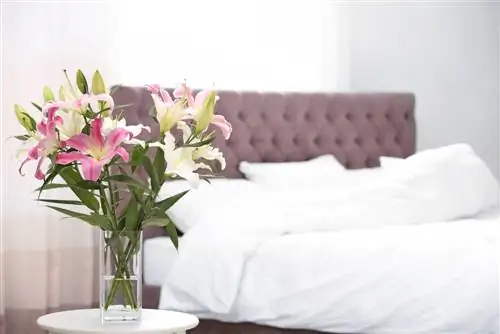
Strongly aromatic flowers have no place in the bedroom
This question can be answered differently from person to person. While some people are sensitive to strong scents, plant lovers perceive the same aromas as sleep-inducing and relaxing. It also applies to allergy sufferers that certain flowering plants should not be placed in the bedroom. If the plants begin to mold, they should be removed from the bedroom. Otherwise, you can have fun choosing your bedroom plants.
Important aspects for plant selection:
- Choose houseplants that feel comfortable in the winter when the bedroom temperature is between 16 and 18 degrees
- prefer large plants as they evaporate more water
- Use plants with lower light requirements
Tip
Dragon trees are incredibly frugal. They thrive in both sunny and shady conditions and can cope with temperatures of 16 degrees.
Frequently asked questions
Are plants in the bedroom unhe althy?
Basically, bedroom plants promote he alth in various ways. The fact that they are suspected of being unhe althy is not entirely true. Potted plants pose a he alth risk if the substrate has been watered over and tends to form mold.
In fact, the plants extract oxygen from the room air at night and release CO2. This happens in such small quantities that no negative effects are expected for humans. Rather, the partner would have to be banned from the bedroom, because he produces 15 to 30 liters of carbon dioxide per hour.
Plants in the bedroom - yes or no?
This question cannot be answered clearly. There are sensitive people who cannot tolerate the smell of strongly scented flowers and are prone to allergies. You should not put plants in your bedroom. For he althy people there is nothing wrong with a green bedroom oasis, as long as appropriate care is taken. In general, plants have a positive effect on the psyche and ensure he althier sleep.
Can plants reduce air pollutants?
Blogs often refer to a NASA study in which the air-purifying properties of many tropical plants were determined. In fact, many plants are able to filter pollutants from the air. This only happens in measurable quantities if the plants are in a completely enclosed space. In the experiment this was a transparent box with an edge length of 70 centimeters. It has now been shown that the filter effect cannot be measured indoors.
Why are bedroom plants good for your he alth?
They beautify the room, have a loosening effect and add colorful accents. The sight of a green bedroom oasis improves your mood and has a positive effect on your psyche in dreary and dark winter months. When you feel comfortable in your bedroom, you can relax better. Your blood pressure drops, you become calmer and can fall asleep better.
At the same time, houseplants improve the indoor climate because they evaporate almost all of the irrigation water, which enters the air we breathe free of pollutants and germs. In summer, the plants act as a natural air conditioning system because they regulate temperatures. They also supply the air with oxygen.

